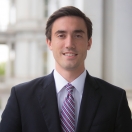
Last month, we welcomed nine Champions of Change for Summer Opportunity to the White House for the launch of the Summer Opportunity Project, a multi-agency effort in partnership with the National Summer Learning Association and other collaborators to provide support to communities. The Champions were joined by local officials, business leaders, and community organizers for workshops to think through ways to make this the best summer ever for young people in America.
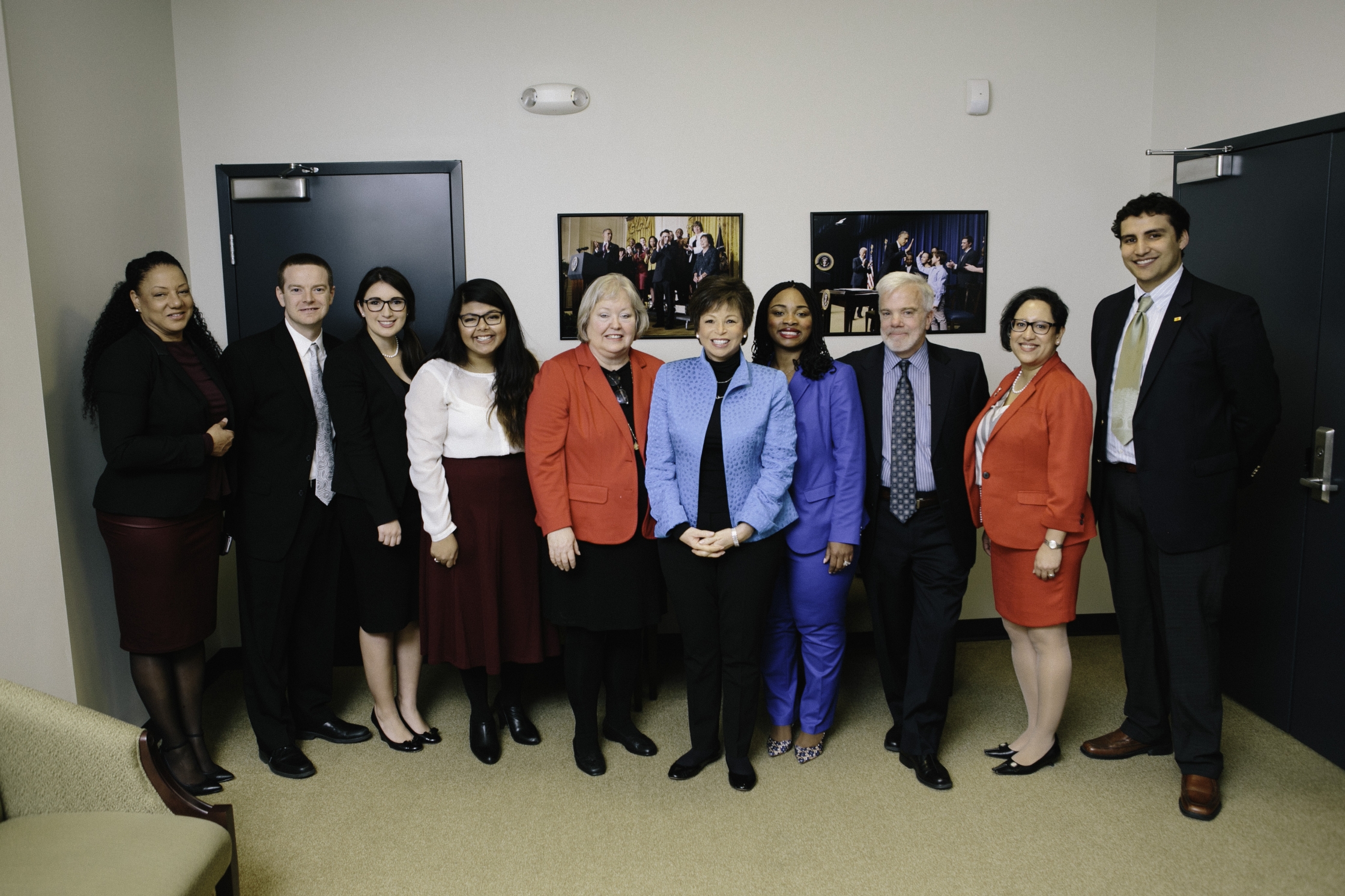
The Champions of Change were selected by the White House for their leadership on investing in, operating or advocating for high-quality summer learning, meals, job opportunities, and violence prevention. They recognize that the summer “opportunity gap” contributes to gaps in achievement, employment, and college and career success, particularly for low-income students.
The day-long event featured remarks from Senior Advisor to the President Valerie Jarrett, Assistant to the President, White House Cabinet Secretary and My Brother’s Keeper Task Force Chair Broderick Johnson, Deputy Assistant to the President and Director of the Office of Intergovernmental Affairs Jerry Abramson, Secretary of Agriculture Tom Vilsack, Secretary of Labor Tom Perez, and Acting Secretary of Education John King.
We had a great time meeting with the Champions and people from around the country who are investing in summer and committed to helping young people achieve their dreams. While there is a lot of work to be done, we hope that this event laid the groundwork for a great summer in 2016.
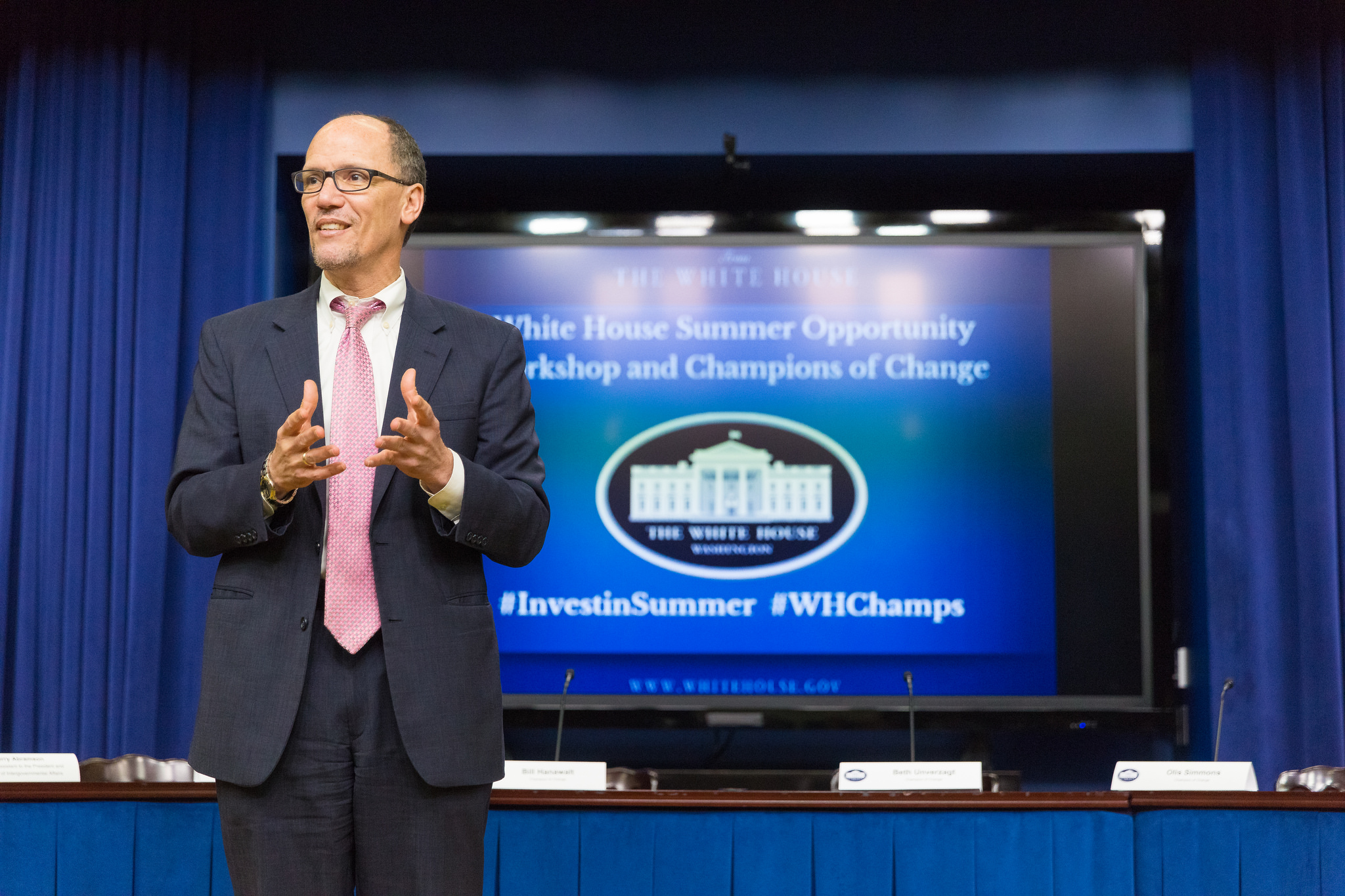
Before the event, the Champions shared some of their reflections with us:
Chekemma J. Fulmore-Townsend
When I was just 14 years old, I spent over an hour on three trains every morning commuting to my first summer job. I worked for a social service agency lending a helping hand to elderly residents with everyday tasks. At a young age, I was already being paid more with my hourly wage than my parents had ever earned. This life-changing opportunity not only helped break down barriers of poverty, but also put me on the path to a Master's Degree in Social Work and a life dedicated to helping others.
Nationally, and particularly in Philadelphia, too many young people are disconnected from the American dream, making it harder for them to get ahead. It is critical to remedy this challenge by providing high-quality opportunities to prepare our young people for the world of work. Youth bring innovation, curiosity, and energy, among other untapped talents. They just need an opportunity to excel.
That is why the Philadelphia Youth Network (PYN) connects schools, nonprofits, local government, and employers to create the critical experiences for young people to learn and succeed. Last year, PYN supported over 10,000 opportunities to help create a brighter future for our young people and our city.
Chekemma J. Fulmore-Townsend is the President and CEO of the Philadelphia Youth Network.
Bill Hanawalt
When I was growing up, summers for me meant fishing trips, swimming lessons, and family vacations. While neither of my parents were wealthy, they always had enough resources to ensure I had fulfilling experiences during school breaks. There was never a question as to whether I would learn and grow each summer.
I spent part of each summer with my dad in Seattle, and the rest with my mom in Los Angeles. My mom would give me a bus pass and I’d spend the days riding around, playing at parks, exploring libraries, and drinking Slurpees. I came home each night safe and sound, just as my mom assumed I would.
If privilege is something one has without having to think about it, then my experiences illustrate the privilege of wealth and the privilege that comes with having white skin in our society. Many students we serve at Peace Community Center do not have these privileges. Their parents might not have resources to pay for academic enrichment or to take them on day trips to the beach or museum. Their parents might worry about whether their children will be treated fairly as they ride the bus or play in the park.
Summer learning opportunities should not be a privilege for a few, but the standard for all. Public schools attempt to bridge this opportunity gap during the school year, but after school gets out, that gap becomes a chasm. Peace Community Center responds to the mandate to work for justice by providing summer opportunities for all students to continue to learn, explore and grow.
Bill Hanawalt is the Executive Director of Peace Community Center in the Hilltop neighborhood of Tacoma, Washington.
Laura Huerta Migus
Summer was always the most anticipated time of the year for me as a child. It meant adventure and freedom to explore the world around me in ways I couldn’t in school. It meant family trips to reconnect with cousins and family far away, reestablishing ties to my family history. It meant going to the library, summer camps, and museums as much as we could and making friendships that transcended the boundaries of neighborhood and school district. Most of all, summer meant an opportunity to play.
Opportunities for the kind of child-directed play available to me during my childhood have been disappearing for the last twenty years, due to lack of funding for open play spaces and the increasing economic pressures that families face, among other issues. Happily, there is a strong movement pushing back on the need, and the right for children to have access to true play and playful learning opportunities. Play is the fundamental mechanism for children’s learning, especially at the earliest ages. Play builds not only cognitive skills that directly contribute to academic success, but also build the social-emotional foundation that is necessary for the persistence necessary for healthy life outcomes.
Children’s museums are critical community resources for promoting children’s right to play, and also are exemplars for how play IS learning. Through our partnership with the Ultimate Block Party, we continue our commitment to the value of playful learning for the future success of the nation’s children – especially those who need the most support to succeed in our current system. Play does not discriminate. All children can play – and all children can learn.
Laura Huerta Migus is the executive director of the Association of Children’s Museums based in Arlington, Virginia.
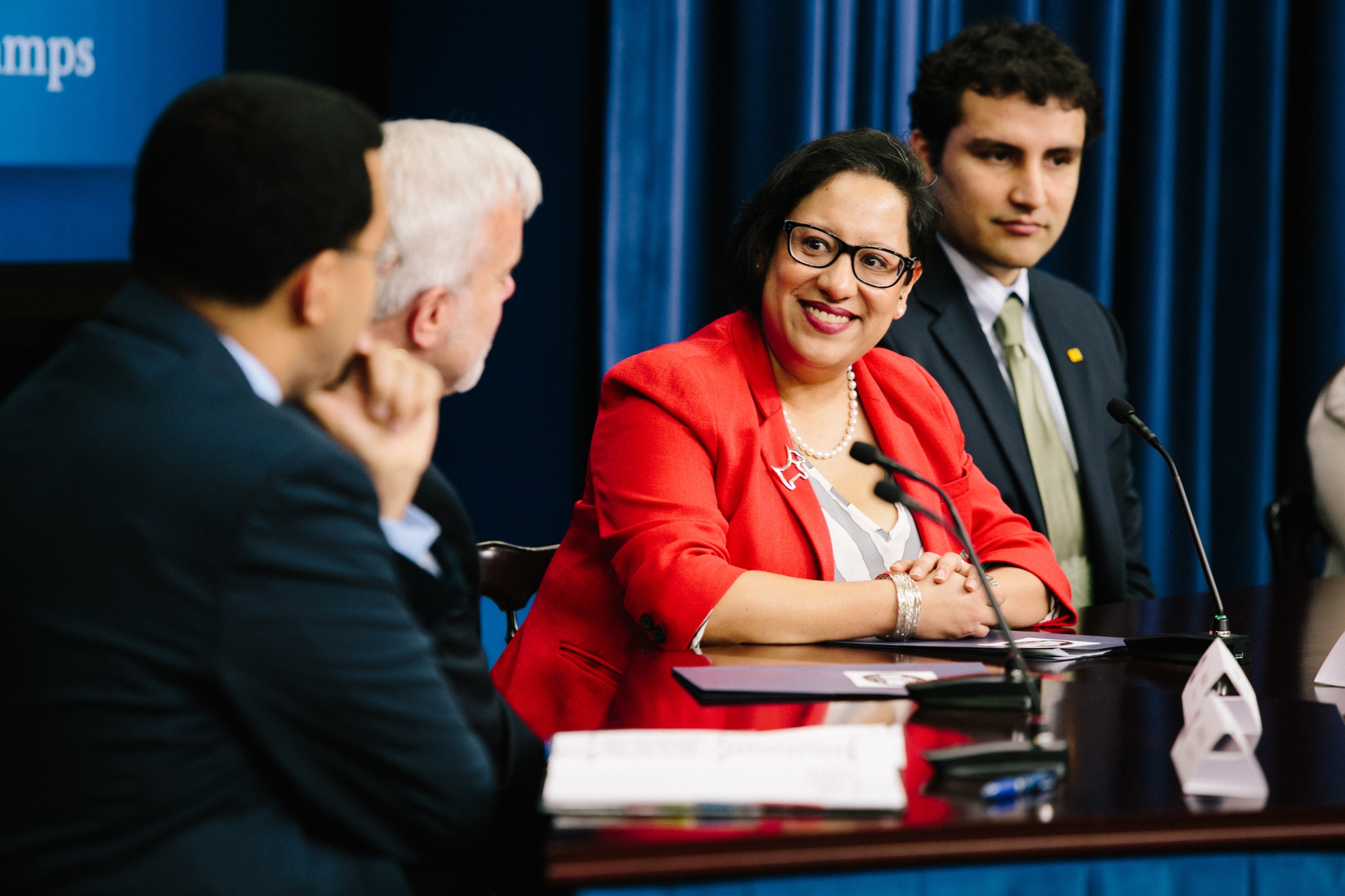
Alec Lee
After graduating from Bowdoin College in 1980, I spent four summers working in the Horizons Upward Bound Program in Detroit, Michigan. That was the first time I saw the transformative power of summer learning. Summer matters.
In 1986, I was a high school history teacher in San Francisco when my colleague, Eleanor McBride, and I discussed the idea of Aim High. We envisioned a high-quality classroom experience for low-income students that incorporated progressive approaches to teaching and emphasized opportunity and high expectations. Our goal was to cultivate a space where students could find joy in learning and feel comfortable taking risks. We envisioned inspiring role models helping our students see and understand the path to college. We imagined making a multi-year commitment to kids and families thus creating a powerful sense of community.
Although our program had no name yet, we were awarded a two-year grant by The San Francisco Foundation to get started. I was driving to school one morning when I thought of the archer, Acestes, from the Aeneid and the name “Aim High” came to me. It captures our spirit of hope and possibility. We launched Aim High that summer with an initial cohort of 50 students. Since our first summer 30 years ago, more than 9,000 students have participated in the program, and many graduates have returned as teachers. In 2016, Aim High will oversee 17 summer campuses and serve 2,000 students. Aim High will also launch Vision 2020, a five-year plan to serve an additional 6,000 students and train hundreds of new teachers,
One of our first graduates, Lakisha Young says of Aim High, “Little did I know that when I walked through those doors in 1987, that many other doors would open for me.” My hope is that Lakisha’s sentiment remains one shared by Aim High graduates for many years to come. After thirty years, I am more inspired than ever by our students, graduates and teachers and by the power of summer learning.
Alec Lee is the co-founder and Executive Director of Aim High, an educational nonprofit serving middle school youth in the San Francisco Bay Area.
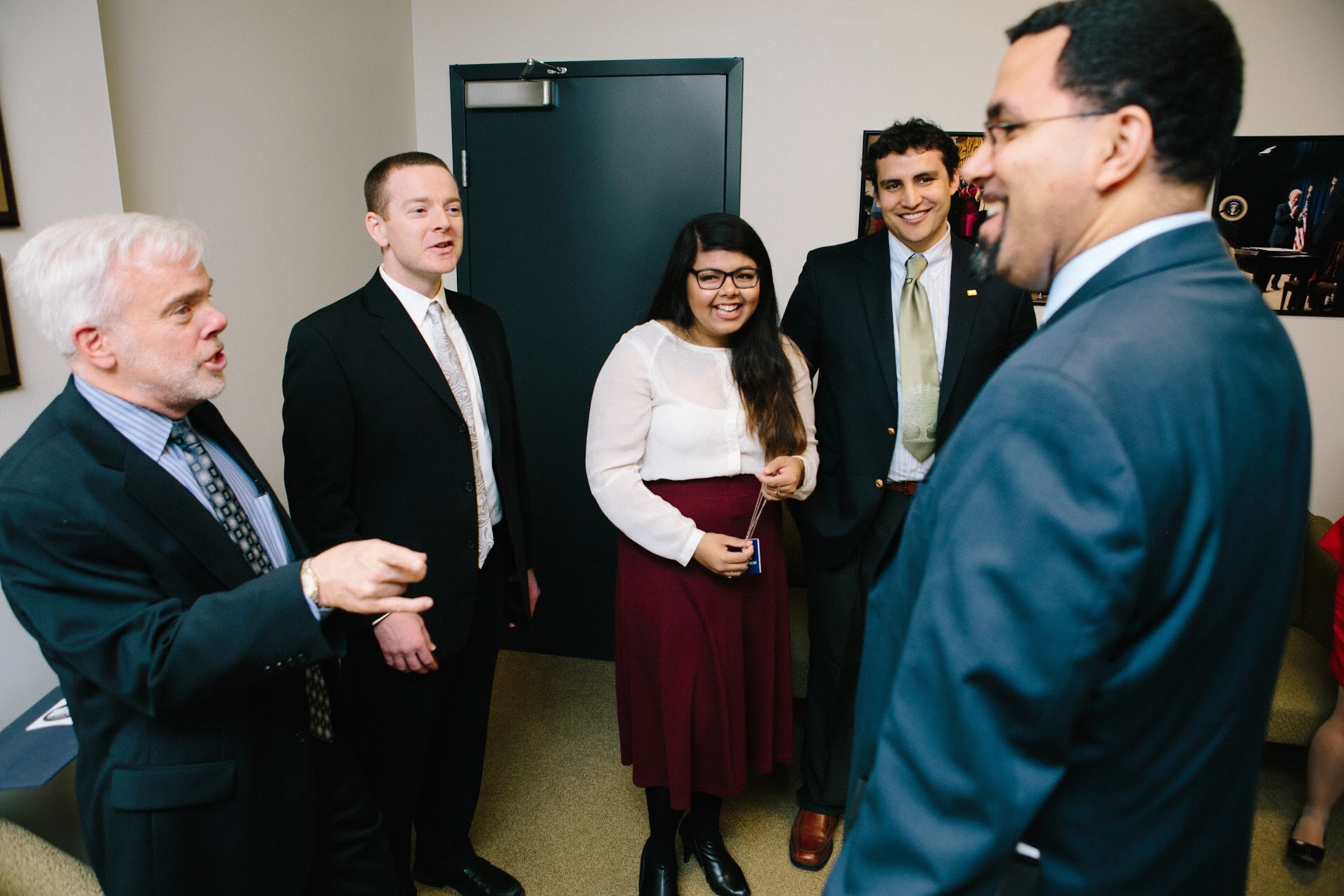
Victor Francisco Lopez
“Ask yourself not what the world needs, but what makes you come alive, and go do it. Because what the world needs is people who have come alive.” - Howard Thurman
For a child, a summer break from school can open a world of opportunity and lead to transformational learning opportunities. During my own childhood, many summers were spent in Guanajuato, Mexico, where my mother taught a summer program for college students. I have one stark memory of visiting a new friend in her neighborhood. I was struck by the dirt floors in her home. While I have since learned much more about socioeconomic inequality in our world, this little detail left a deep impression.
More than a decade later, having graduated from Occidental College, and completed a fellowship in community organizing, I was eager to start implementing some of my own ideas to promote social justice. While working to get a micro-lending nonprofit off the ground, I was an elementary substitute and coached chess to make ends meet. As the school year ended, I decided to start a summer chess camp.
During that first summer chess camp, Howard Thurman’s eloquently truthful quote began to really make sense. Seeing the light bulbs of learning illuminate in children's minds made me come alive: I celebrated their successes with jubilant excitement and I found myself daydreaming about new lesson plans that could connect chess to larger life lessons. Finally, at one critical moment the following summer, I put my micro-lending nonprofit to the side and focused exclusively on using the game of chess to teach kids intellectual, social, and leadership skills.
Fueled by my dual passions for making a positive difference and teaching chess, I built an organization--Learners Chess Academy--that works with over 1,100 students every week in our after school programs, over 300 students each summer in our chess camps, awards over $15,000 of chess program scholarships a year to families in need, and runs chess programs in low income schools at no cost to participants. While research shows the many positive benefits learning chess has on a developing child's mind, at Learners we also use chess to mentor students and teach them life skills. Our curriculum incorporates a mindfulness practice and our Jr. Leadership program allows us to instill values of loving what you do and coming alive as a strategy to motivate youth and make a difference in the lives of others.
For me, one summer break planted the seeds of making a difference in the world, while subsequent summers have provided me with opportunities to come alive and offer my community unique and meaningful learning experiences through a game I love.
Victor Francisco Lopez is the Founder and Executive Director of Learners Chess Academy in Albuquerque, New Mexico.
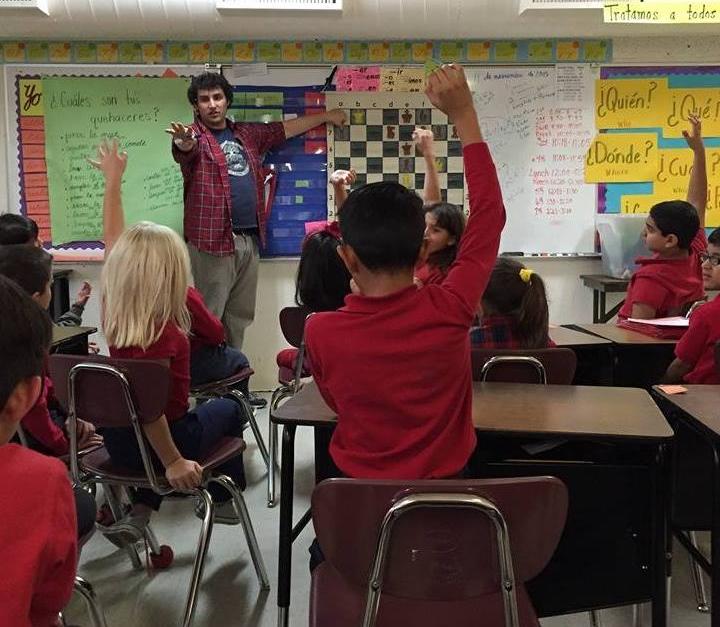
Riya Rahman
Before I started working with the Texas Hunger Initiative (THI) and Share Our Strength, I had no idea that 42 million people in the U.S. struggled with food insecurity. I had always associated hunger with developing countries like Bangladesh, where my parents were raised. My father grew up in a rural village with nothing. I heard about how he never knew where his next meal was coming from, and there were many nights when he went to bed hungry. My dad worked hard to build a better life for my brothers and me. To me, America was that better life.
Once I realized that America did not represent a better life for everyone, and that hunger was prevalent in the U.S., I knew I wanted to make a difference. When I started working for the THI in Dallas, I didn’t realize how much it would change me. I observed the Summer Meals Program in my own community, and I used my experiences to advocate on behalf of the children who need the program. I helped implement the Excellence in Summer Meals Campaign, which allowed us to recognize good sponsors in Dallas, while encouraging other sponsors to incorporate best practices. I went to various Summer Meals sites, and I got to hear what was working and what wasn’t working for children in need. This campaign worked to make Summer Meals more efficient, which helped more kids get access to meals they need. There is still more work to be done, but I look forward to ending child hunger in our lifetime.
Riya Rahman is a senior political science student at Baylor University.
Lauren Reilly
When I taught in the Bronx and Harlem, I remember feeling constantly defeated. Growing up I was blessed with books that replaced Spongebob and dinner conversations that were rich with new vocabulary, while for my students—education was a fourth priority, crippled first by safety, shelter, and food.
I tried to solve many of the problems. I had cereal in my cabinets, deodorant in my drawers, and a smile on my face as I taught students to fall in love with history. Each year, my students knew I had their best interests in mind. Until summer came. During summer I couldn’t make that difference. There were no opportunities for my kids then. And when they came back to school in the fall? It felt like starting over. Any progress we had made over the school year was gone.
I joined Practice Makes Perfect (PMP) to further develop a program that not just solved the “summer slide” but also helped students develop an intrinsic motivation for learning year round. Today, PMP is an evidenced-based, direct service summer school provider that drives student outcomes using an innovative near-peer mentoring model. Now I’m able to give my kids an opportunity for summer learning, while also making it fun!
Historically, summer was a time where students lost knowledge. For me, it is a time to “summer forward.” It is a chance for scholars to make long-lasting relationships with older, high achieving mentors who come from the same inner-city neighborhoods. It is an opportunity to develop the soft skills like perseverance and leadership. Ultimately—the summer is when we can change a life trajectory.
When I was teaching I felt like my students and I were on an island. With PMP, our students finally have the support systems in place to truly create praxis. To escape the island and see that success is tangible and not so daunting after all.
Lauren Reilly is the Program Director for Practice Makes Perfect and a former New York City educator and Teach for America alum.
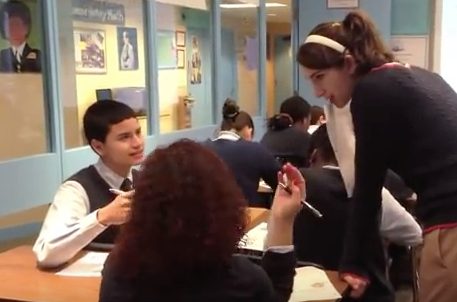
Olis Simmons
At fifty-five years old, I know that work defines me and that my first job, a summer job, began my life of service.
Born and educated in New York City, I grew up poor and worked every summer -- at park sites, in offices, and at local businesses. These jobs taught me how to be a worker, a team member, and ultimately a leader. These jobs were the foundation on which I could one day birth a cradle-to-career continuum for the children our nation is leaving behind. Children like me. In the extremely hard lift of leading while Black on behalf of Black children, I carry a commitment to creating great summer experiences that unleash the power of summer to make life-long memories and build core life skills.
It’s hard to believe I’ve been working in the Castlemont Community for ten years. In this time, we have served more than 14,000, each a young life we are shaping to be curious, excellent, and of service. I see myself in these young faces, and they give me hope for our nation, even in the face of growing racial inequity and economic injustice. Their ease with technology and discomfort with conventions show me that maybe we are headed to the Promised Land at last.
Olis Simmons is the founding President and CEO of Youth UpRising, a multi-service youth leadership development organization in Oakland, California.
Beth Unverzagt
In Oregon, we know that to succeed in school and life, children and young adults need ongoing opportunities to learn and practice essential skills. This is especially true during the summer months.
OregonASK decided to “Do Something” because national research combined with Oregon’s harrowing statistics, highlighted the need for a summer intervention tactic. We used data to identify schools, correlated data with schools reporting low reading scores and food insecurity, and we identified and talked with 141 sites that had 50% free or reduced lunch and children reading below 3rd grade benchmark.
OregonASK staff worked to develop The Summer Learning Partnership. It is a unique example of state level partnership in action. OregonASK partners are the National Summer Learning Association, Oregon State Library, Oregon School Librarian Association, Oregon Volunteers – Corporation of National Service, Oregon Department of Education – child nutrition, migrant education and English language arts to grow a project that in 2015 kept the doors of 30 school libraries open. In addition to library book access, students were given access to free books via the partnership of Salem-Keizer Education Foundation and Bazillion Books for Kids, summer meals via the USDA Summer Meal Service Program and in some locations educational and engaging activities such as group read-a-loud and books clubs and STEM activities.
We believe summer is not about more school but about creating an environment that enriches the lives of children and youth that are farthest from opportunity. This means programs that engage children and youth in meaningful activities that they can reflect upon; that are culturally responsive; and ones that offer opportunities to learn with hands on project-based learning.
Beth Unverzagt is the director of OregonASK and lives in Wilsonville, Oregon.
